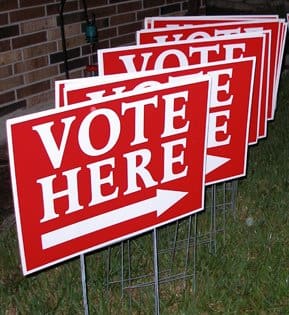Texas Democrats are fighting in court to restore “mobile” early voting after state lawmakers banned the easily manipulated practice, also known as “rolling polling.”
Earlier this year, after a couple of tries, lawmakers finally put an end to rolling polling in Texas because local officials were using the process to tilt election results in their favor. The power to pick specific voting locations and move polls frequently allowed officials to target favorable voters while depressing general turnout.
The Texas Democrat Party filed a lawsuit Wednesday along with two national Democrat groups seeking to block House Bill 1888, which eliminated the ability of election officials to move temporary polling stations from place to place throughout the early voting period.
The new law requires all early voting polling places to be open the same days and hours as a county’s main early voting site, giving all voters uniform access to the polls.
Democrats claim HB 1888, which went into effect September 1, results in unconstitutional age discrimination by making it harder for college students to vote:
HB 1888 effectively bans “temporary” or “mobile” early voting, which afforded county officials the discretion to open early voting locations with flexible hours and days, giving them the chance to bring early voting opportunities to as many voters as possible, including thousands of young Texans living on or near college or university campuses and without reliable access to transportation.
The complaint claims the Republican-sponsored legislation will lead to “substantially fewer early voting opportunities for young voters,” who plaintiffs expect will vote for Democrats.
Marc Elias, the lawyer for Hillary Clinton’s failed presidential campaign and now Sen. Kamala Harris’, filed the complaint in federal district court in Austin. The lawsuit is one of several Elias has initiated across the country, seeking to make state voting rules more favorable to Democrats. Elias heads the political law group at Perkins Coie and represents the Democratic National Committee and a host of national Democrat groups and candidates.
Texans have been calling on the legislature to end mobile voting for several years. Taxpayers objected to local government entities cherry-picking voters sympathetic to ballot issues like bond debt and tax increases. Rolling polling let officials arrange for ballot-question beneficiaries to make up a higher percentage of those voting, skewing the results in their favor.
School districts like Frisco ISD and Lancaster ISD routinely took mobile polling places from campus to campus during school bond and tax rate elections, making it much easier for teachers and staff to vote than for other voters in the district. In an election for a new hospital district and a property tax to support it, Hidalgo County placed mobile voting stations in over a dozen hospitals that would directly benefit from the new tax.
County election officials could likewise approve mobile polling places where they believed voters were likely to match their political views.
Texas lawmakers finally did away with the unfair practice of rolling polling, restoring a uniform voting process that improves election integrity. Democrats lost in the legislature, so they will try to get what they want—a more easily manipulated process—in the courts.





